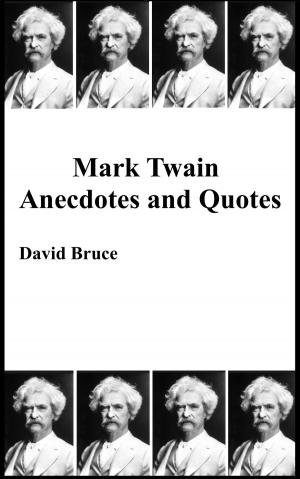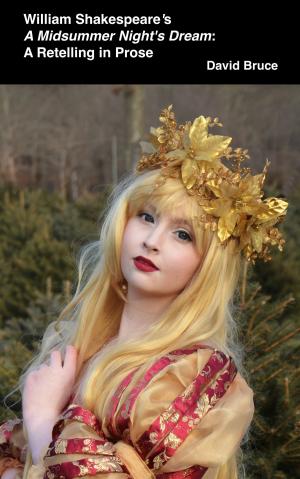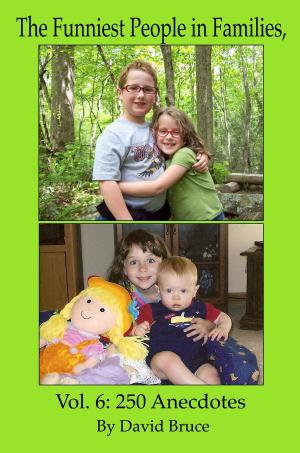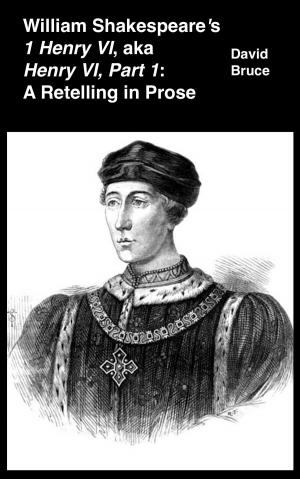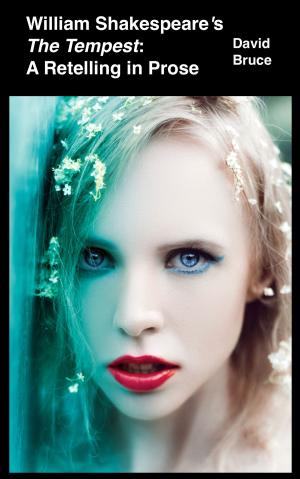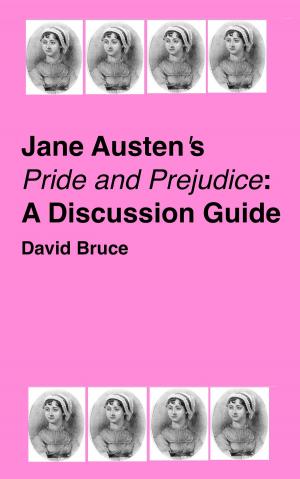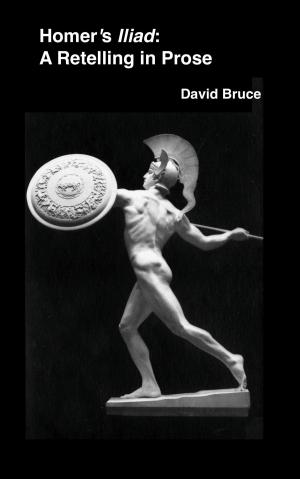| Author: | David Bruce | ISBN: | 9781370364022 |
| Publisher: | David Bruce | Publication: | December 22, 2017 |
| Imprint: | Smashwords Edition | Language: | English |
| Author: | David Bruce |
| ISBN: | 9781370364022 |
| Publisher: | David Bruce |
| Publication: | December 22, 2017 |
| Imprint: | Smashwords Edition |
| Language: | English |
This is an easy-to-read retelling of John Ford's tragedy "'Tis Pity She's a Whore." In this tragedy, a brother and sister fall in love and commit incest.
— 1.1 —
In Friar Bonaventura’s cell, the good friar and Giovanni were in the midst of a serious discussion.
“Dispute and argue no more about this,” Friar Bonaventura said, “for know, young man, that these are no school points.”
School points are topics proposed for discussion in theological schools.
He continued, “Nice philosophy may tolerate unlikely arguments, but Heaven admits no jest.”
“Nice philosophy” is philosophy that makes over-precise distinctions.
“Jest” means both “exception” and “sophistry.”
He continued, “Wits, aka educated men, who presumed on wit, aka human intelligence, too much, by striving how to prove there was no God with the foolish grounds of argumentation and methods of reasoning, discovered first the nearest, shortest way to Hell, and they filled the world with devilish atheism.
“Such questions, youth, are foolish. Far better it is to bless the sun than to reason why it shines. Yet He you talk about — God! — is above the sun.
“No more! I may not hear what you say in argument.”
“Gentle father,” Giovanni said, “to you I have unclasped my burdened soul as if it were a book. I have emptied the storehouse of my thoughts and heart, and I have made myself poor of secrets. I have not left another word untold, which has not spoken all that I ever dared, or think, or know. And yet here is the comfort I shall have?”
The comfort that Friar Bonaventura was saying was available to Giovanni was obedience to God’s laws.
Giovanni continued, “Must I not do what all men else may — love?”
Friar Bonaventura said, “Yes, you may love, fair son.”
Giovanni said, “Must I not praise that beauty, which, if framed anew, the gods would make a god of, if they had it there, and kneel to it, as I kneel to them?”
Giovanni was worshipping the wrong gods — the pagan gods. These gods are not omnipresent, omniscient, omnibenevolent, or omnipotent.
Shocked, Friar Bonaventura said, “What, foolish madman!”
Giovanni interrupted: “Shall a peevish, weak sound, a customary form, passed from man to man — a purely manmade convention passed from generation to generation — concerning brother and sister, be a bar between my perpetual happiness and me?
“Say that we had one father, say that one womb — a curse to my joys! — gave both of us life and birth. Are we not, therefore, each to the other bound so much the more by nature? Are we not, therefore, each to the other bound by the links of blood and of reason?”
By “blood,” Giovanni meant blood relationship, but in this society the word also meant lust.
He continued, “Indeed, if you will have it, are we not, therefore, each to the other bound even by religion, to be forever one: one soul, one flesh, one love, one heart, one all?”
Friar Bonaventura said, “Stop! Be quiet, you unhappy, unfortunate youth! For you are lost!”
Giovanni said, “Because I am her brother born, shall my joys then be forever banished from her bed?”
Giovanni had fallen in love with his sister, Annabella, and he wanted to have sex with her.
This is an easy-to-read retelling of John Ford's tragedy "'Tis Pity She's a Whore." In this tragedy, a brother and sister fall in love and commit incest.
— 1.1 —
In Friar Bonaventura’s cell, the good friar and Giovanni were in the midst of a serious discussion.
“Dispute and argue no more about this,” Friar Bonaventura said, “for know, young man, that these are no school points.”
School points are topics proposed for discussion in theological schools.
He continued, “Nice philosophy may tolerate unlikely arguments, but Heaven admits no jest.”
“Nice philosophy” is philosophy that makes over-precise distinctions.
“Jest” means both “exception” and “sophistry.”
He continued, “Wits, aka educated men, who presumed on wit, aka human intelligence, too much, by striving how to prove there was no God with the foolish grounds of argumentation and methods of reasoning, discovered first the nearest, shortest way to Hell, and they filled the world with devilish atheism.
“Such questions, youth, are foolish. Far better it is to bless the sun than to reason why it shines. Yet He you talk about — God! — is above the sun.
“No more! I may not hear what you say in argument.”
“Gentle father,” Giovanni said, “to you I have unclasped my burdened soul as if it were a book. I have emptied the storehouse of my thoughts and heart, and I have made myself poor of secrets. I have not left another word untold, which has not spoken all that I ever dared, or think, or know. And yet here is the comfort I shall have?”
The comfort that Friar Bonaventura was saying was available to Giovanni was obedience to God’s laws.
Giovanni continued, “Must I not do what all men else may — love?”
Friar Bonaventura said, “Yes, you may love, fair son.”
Giovanni said, “Must I not praise that beauty, which, if framed anew, the gods would make a god of, if they had it there, and kneel to it, as I kneel to them?”
Giovanni was worshipping the wrong gods — the pagan gods. These gods are not omnipresent, omniscient, omnibenevolent, or omnipotent.
Shocked, Friar Bonaventura said, “What, foolish madman!”
Giovanni interrupted: “Shall a peevish, weak sound, a customary form, passed from man to man — a purely manmade convention passed from generation to generation — concerning brother and sister, be a bar between my perpetual happiness and me?
“Say that we had one father, say that one womb — a curse to my joys! — gave both of us life and birth. Are we not, therefore, each to the other bound so much the more by nature? Are we not, therefore, each to the other bound by the links of blood and of reason?”
By “blood,” Giovanni meant blood relationship, but in this society the word also meant lust.
He continued, “Indeed, if you will have it, are we not, therefore, each to the other bound even by religion, to be forever one: one soul, one flesh, one love, one heart, one all?”
Friar Bonaventura said, “Stop! Be quiet, you unhappy, unfortunate youth! For you are lost!”
Giovanni said, “Because I am her brother born, shall my joys then be forever banished from her bed?”
Giovanni had fallen in love with his sister, Annabella, and he wanted to have sex with her.



